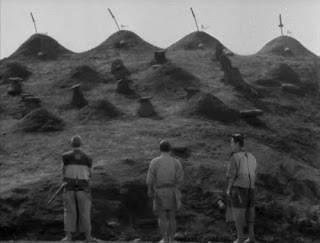The basic plot is just one line, and nothing more. A sixteenth century japanese village hires seven samurai to fight a group of bandits about to loot its farmers. So, how do you spin such a thin plot into a good story?? Hire a good scriptwriter. And Akira Kurosawa is a master. Now that you have a good script, how do you make a movie that is exciting and moving?? Rope in a good director. And Akira Kurosawa is a genius.

Although the plot is simple, the writers have given 'Seven Samurai' enough depth with many sub-plots and details. This is especially true with the war scenes that contain a lot of detail. The different strategies adopted by the samurai to fight the bandits forms most of the second half. This includes defending the village, by constructing barricades along three sides of the village and a moat along the other, and attacking the bandits one at a time. The samurai not only train the villagers, but also exhort them into fighting off the bandits. While battle forms the second half, the first half focuses on the penurious state of the farmers and also on the recruitment of the seven samurai.
Among the crowd of actors, Takashi Shimura and Toshiro Mifune clearly stand out. Takashi plays Kanbe, a warm hearted samurai who is the first to offer help to the villagers. He is instrumental in building the rest of the team and is also the one who is the war strategist. Toshiro Mifune plays Kikuchiyo, a ruffian who is the last samurai to be inducted into the team. While Takashi plays Kanbe with a calm demeanor, Toshiro's Kikuchiyo is fierce and boorish. The primary themes in 'Seven Samurai' are the pathetic state of affairs with the farmers and the build up to the battle. With such serious themes, it is Kikuchiyo who provides the necessary relief with his funny mannerisms and antics. The background music is heavy and is apt in generating the battle mood.
Akira kurosawa must have taken great pains to make this fiction look authentic. The movie was definitely not shot indoors and the battleground comes alive in the second half. There are no extra-ordinary stunts and hence all the combat scenes are credible. Another notable technique in 'Seven Samurai' is the use of weather to heighten the mood of a situation. It is sunny when the plight of farmers is highlighted in the early parts of the movie. There is a heavy wind when Kanbe exhorts a group of frightened farmers to pick up their spears and prepare for battle. It is foggy when the team waits for Kyuzo, who leaves the boundary to bring the first gun [another intent of using the fog was probably to depict dawn]. And yeah, it rains cats and dogs in the final showdown, accentuating the struggle during a battle.
There are many sub-plots that make 'Seven Samurai' interesting. The camaraderie among the warriors is enjoyable. There is also a love story as the youngest samurai, Katsushiro, falls for the village girl, Shino. Another major thread is the way people from two different ranks of the society come to terms with each other. It is very clear that the farmers belong to the lower echelons of society and the samurai belong to the prestigious warrior class. The farmers, who are initially hesitant to welcome the samurai, gradually learn to honor their guests. Similarly, misgivings of the farmers are rationalized to the samurai during Kikuchiyo's emotional outburst [and Toshiro Mifune excels here]. Some fundamentals of war are also explained to the viewer, as part of discussions that Kanbe has with his fellow samurai. A combination of all these sub-plots makes 'Seven Samurai' a very moving motion picture.
There is one minor nit in this film. Given that this movie runs for more than three and half hours, I think there is one sub-plot that could have been avoided [at least to reduce its running time]. When the farmers come to a neighboring city to hire samurai, they dwell with beggars. The beggars constantly ridicule the farmers and their destitution. While this highlights the farmers' poverty, the beggars' screen space could have been reduced. But, in the overall scheme of things, this nit is hardly noticeable.
The most striking part of this film is the climax. And by climax, I do not mean the final battle showdown, but the very end where Kanbe mentions, "The winners are those farmers, not us". This is the most touching and moving portion of 'Seven Samurai' and makes a huge impact on the viewer. It is deeply saddening to see the cold treatment being meted out to the three surviving samurai. Akira Kurosawa concludes 'Seven Samurai' by showcasing the forgotten heroes.

As I said... this classic is timeless!!!

Bharati!!!...nice blogs mama..havent seen either movies...ippudu choosta
ReplyDeletelovely writing shakiee machi...
ReplyDeletenice clarity in analysing the movie.
waiting for more to come...
btw do you write review of movies on request?
keep up the good word da
-suri
Geez... thanks guys!!
ReplyDeleteHmm. Will watch it surely. Do you have softcopy? I will get it from you if so.
ReplyDelete